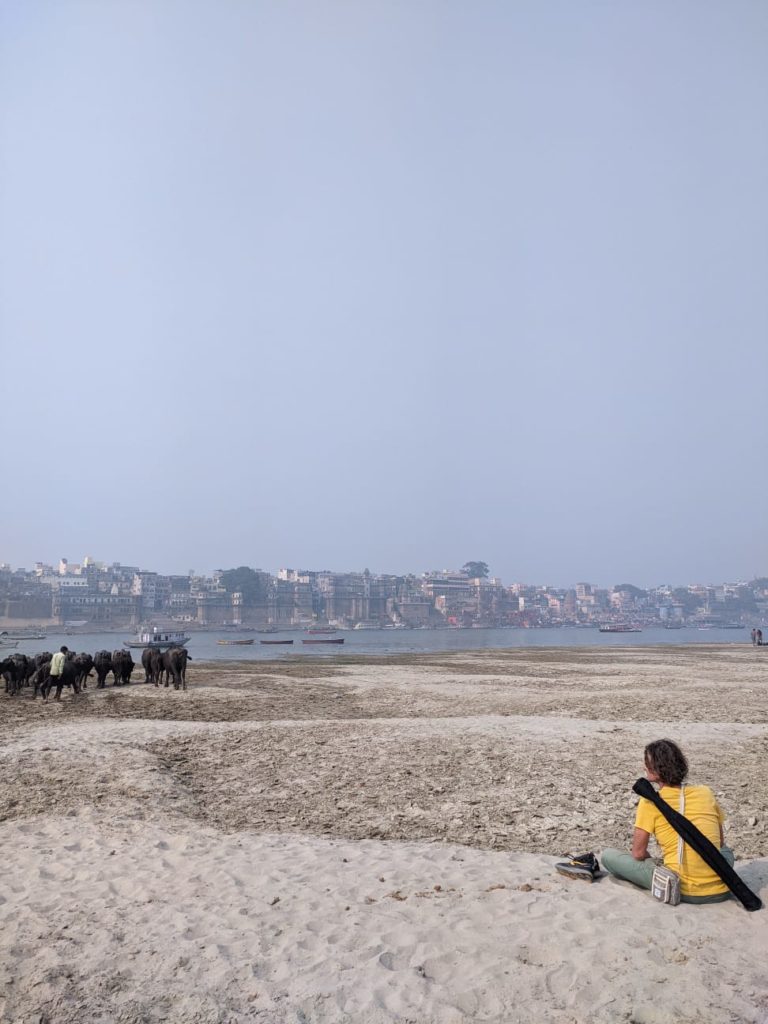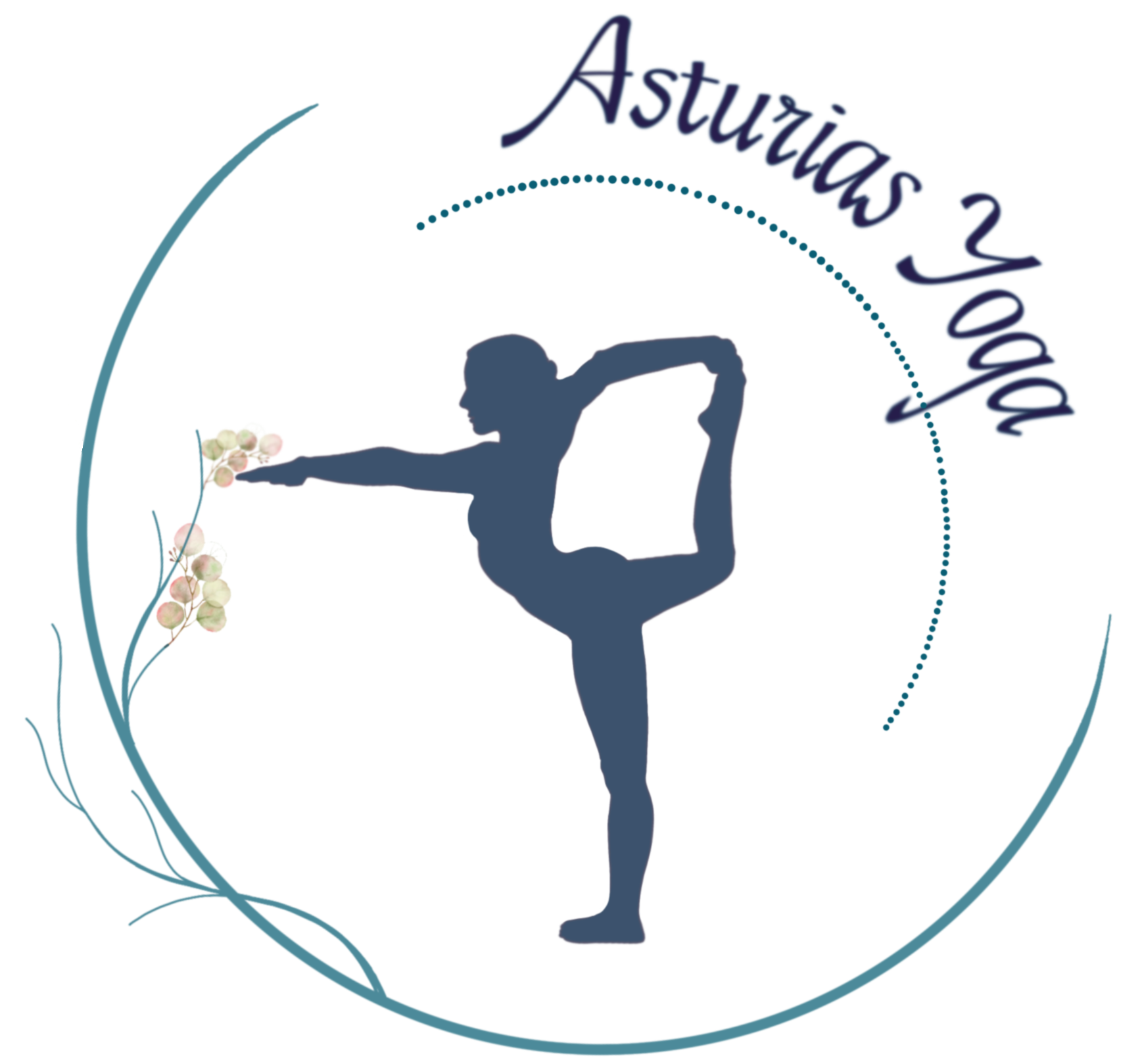Despite 30 years of travelling the world and two previous visits, coming to Varanassi, I still experience culture-shock. No other city can prepare you for this one. On both previous visits I left quickly, fearful of what I might become in such a place, afraid that I might easily loose my mind. This time I wanted to stay longer, but after 24 hours I was already thinking about a train ticket back to Rishikesh. I resisted and stayed two weeks, and finally came to be enchanted, and would have happily stayed longer if I had not agreed to meet my family in Delhi.
Artists talk about the light, the in Varanassi. The light is neither bright nor dull, it is a light where nothing is clearly defined, maybe from the abundance of water and smoke, things shimmer, It is a light necessarily supplemented by imagination. It is the light that permeates dreams, and indeed, everything here is surreal, unpredictable and metaphoric as in a dream.
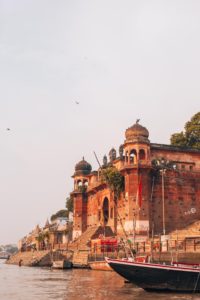
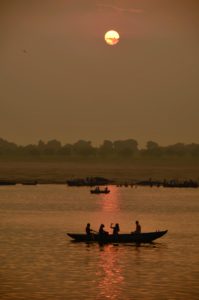
The old city is said to be the oldest continually inhabited place in the world. The dense labyrinth of tight cobbled alleys cannot be accessed by cars. Shop produce arrives by hand pulled wooden carts, building materials in the saddle bags of loaded donkeys. Space is at a premium. At the cubby hole where I drink chai, one rice sack serves as a seat for customers. Mama makes chais and chapatis right beside me for pilgrims passing in the alley, neatly snugged in the midst of snacks, biscuits and cigarettes. Just behind her Papa and daughter are watching a TV show in Hindi, oblivious to my presence. At night they roll out a mattress there and pull down the front shutters. They share a tiny bathroom with the neighbours. A home for 3 and a business in 10 m2.
The tight alleys abound with animal life, dogs and cows wander freely along the cobbles, monkeys on the rooves, swinging from one to the other on the ubiquitous electric cables, giant rats pop up everywhere. The pavements hold the assorted excrement of all. Hygiene is a challenge in such a place, and most of the travellers seem to have stomach issues. I too develop a stomach issue and some fever. But fever feels appropriate here, my vision has felt feverish since my healthy arrival.
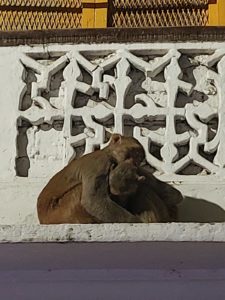
Night-time. Cale and I walk the ghats. The night is my favourite time, the ghats are quiet and we can play music and marvel in peace at the high palace walls and temples that line the river (in the daytime we are continually interviewed and harangued for ‘selfies´).
The night always ends at the burning ghats – the one place in the city that never sleeps. People do not stop dying at night, and in India this is where most Hindus hope to arrive for their final corporal rites, to be reduced to ash and dissolved in the river they consider a Goddess. A corpse arrives every 5 minutes covered in saffron cloth, is dipped in the holy water and then pasted with Ghee (clarified butter) and mounted atop a large stack of firewood. Some dry reeds are then lit by a family member from a fire inside the temple, said to have been burning continually for 3 thousand years (a priest smears its ash on my forehead). This ‘eternal flame’ is then used to light the pyre. The cloth burns off and the melting corpse slowly emerges. Five or six bodies burn at a time in proximity. And in this deeply unfamiliar scene, one sense is very familiar – smell. It is the smell of a common barbecue.
Many are, congregated, some cremating relatives, other just seem to be hanging out, enjoying some heat and company in the mid-winter night. There are chai vendors and snacks. Some family members film disintegrating relatives on their phones, which seems to me appalling, but I am clearly the only one who thinks that way. Indeed, nothing seems anyway appalling to anything but my conditioning. The only tabu it seems, are tears. People are “passing over”, a natural and inevitable human process. Moksha, liberation from the body, is now possible, a thing to be celebrated. There is nothing funereal in the atmosphere, rather there is kindness and open exchange. “For man, last thing to burn is the sternum” Nirmal, a Varanassi resident, tells me matter of factly, “For woman it is the hips”. A baba smeared with ash of the dead sits in an elevated spot above a pyre, smokes a chillum loaded with hashish without cease, he claims to transcend the fear of death. A very stoned western girl sits beside him, she is gone gone, gone, someone should tell her Daddy.
Day time.
Cale and I had arranged to meet at the Harischandra burning Ghat, before crossing the Ganges together. It was a point of reference, a place we both knew well, so why not meet there? As we catch up, kites fly overhead, controlled from adjacent rooftops. 20 yards away the boys are playing football. The ghats provide some open and flat place in an otherwise extremely densely packed city. The game is animated, World Cup inspired. Bollywood music drifts from a nearby window. Cale and my conversation is interrupted by the fire attendant, who asks us to help him out. Most unusual is the natural manner in which he asks. It is a genuine request. Perhaps he was just tired, all day pushing round heavy logs and corpses and we looked like two fit men, idly watching as he labours, burning multiple bodies on multiple fires, continually re-arranging the heavy firewood under pressure to reduce them entirely to ash (the only time we saw someone angry was when a fire went out leaving bits of limbs uncremated). The request to help with burning the bodies is unexpected and leaves us feeling confused and outside our comfort zones. Instead of helping, we get up to find ourselves an oarsman. As we do so there is a big cheer from the boys – a goal has been scored.
The rowing boat sets off from the riverside where density of life is almost beyond comparison, where families live in ancient rooms the size of a large cupboard, the alleyways are so narrow and deep that the sun never enters. Ten minutes to row across the river and we disembark in an empty wilderness. Sand stretches to the fuzzy horizon. We have crossed over, space is endless, it seems metaphoric. Daytrippers are taking a camel safari. A herd of Buffalo driven by a quiet youth come for bathing
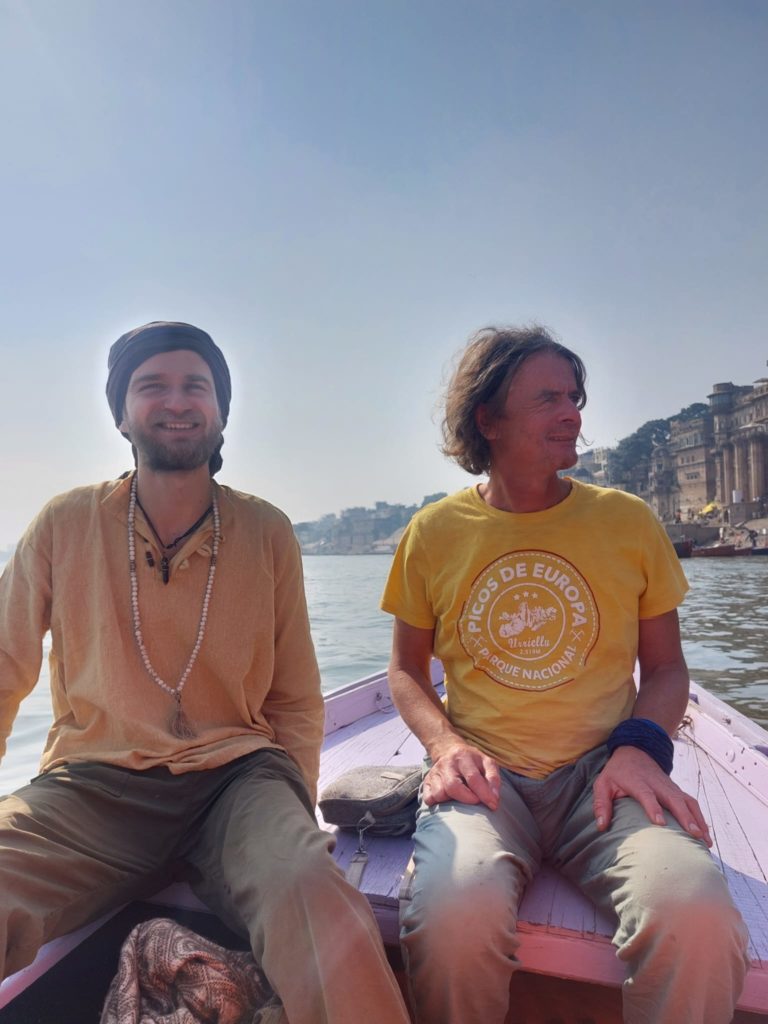
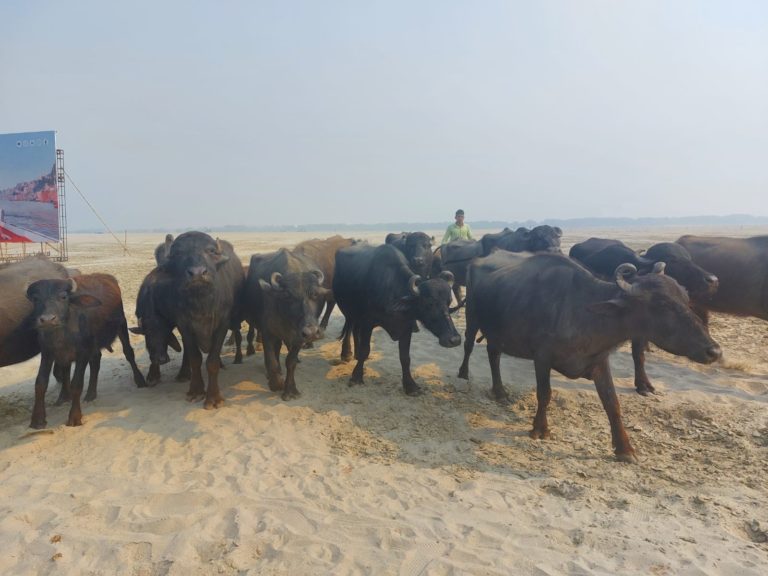
We walk to where we are alone and sunbathe. The river water is now clean, painstakingly filtered under recent government schemes. When I was here 20 years ago it was black. Now it invites for a dip. The midday sun is warm, so why not? As I walk barefoot to the water’s edge I discover a half-burnt corpse in the sand. The hands feet and head are missing. It holds my attention for a minute.
I wade into the water. There is no escaping death, and yet here in Varanassi, it seems so close to life. When I accept that, a deep beauty reveals itself to me.
